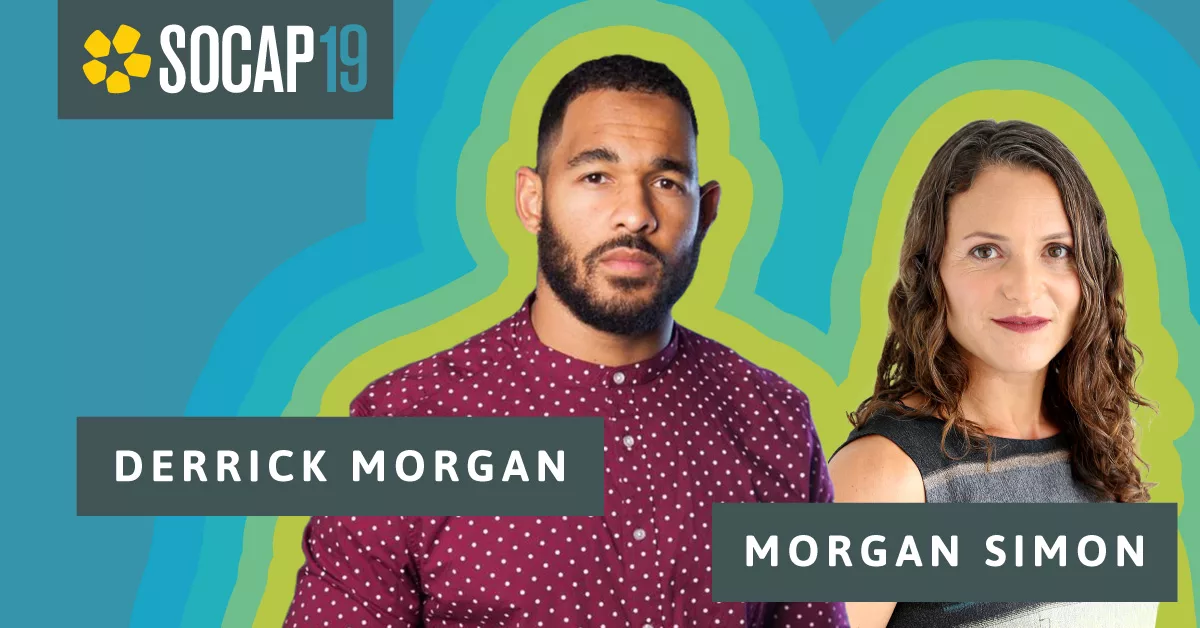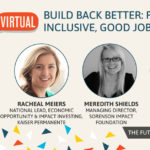By Mandy Gardner
Real Money Moves is a movement working to get people and institutions to pull their investment dollars out of private prisons in the United States and put that capital into communities that have been harmed by mass incarceration and the government’s family detention policies.
Real Money Moves is the non-profit affiliate of social investing firm Candide Group, led by Morgan Simon, co-founder of Candide Group and author of the book Real Impact: The New Economics of Social Change. Simon and her colleague, Jasmine Rashid, have already helped pressure JPMorgan Chase, Wells Fargo, Bank of America, SunTrust, BNP Paribas, PNC Bank and Fifth Third Bank to agree that they will no longer underwrite loans and bonds for the companies that run private prisons and family detention centers or enter into any future deals to fund those organizations.
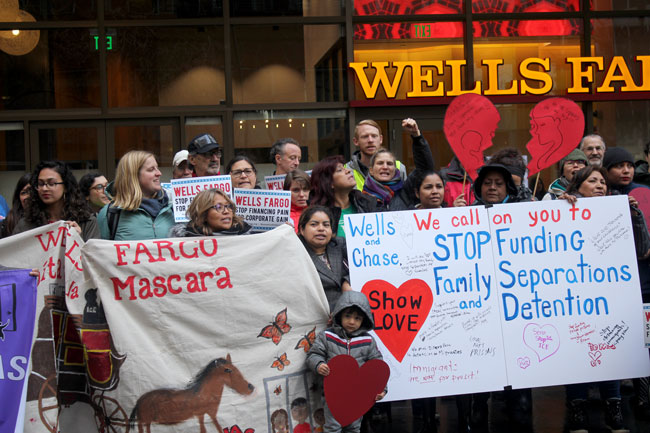
Photo credit: Jasmine Rashid
Real Money Moves’ influence campaigns are supported by celebrities such as cast members of Orange is the New Black, Natalie Portman, and NFL player Derrick Morgan. Morgan, the recently retired linebacker from the Tennessee Titans, has become a prominent impact investor. Shortly before announcing his retirement from the NFL, Morgan established the KNGDM Impact Fund which is raising $50 million to invest in real estate and operating businesses in marginalized communities that have been designated as Opportunity Zones.
Morgan and Simon will be speaking at SOCAP19 in conversations about their efforts to create social change and inspire new impact investors. We recently sat down with both of them to talk about Real Money Moves, their Opportunity Zone fund, and the work they are doing to get out the message that each individual can leverage the power of their money to help create a more just and equitable world.
SOCAP: What do you wish more people knew about privately owned prisons and family detention centers and the impact that they’re having on communities in America?
Morgan Simon: Private prisons hold 10% of the U.S. prison population and over 70% of immigrants held in detention. Executives at companies that run private prisons have gone on the record saying that they see immigrant detention as an area of opportunity. I think that is a statement that many folks–in seeing the incredible suffering that immigrants have faced in these detention facilities–would see as a pretty abominable thing to say.
Private prison companies spend tens of millions of dollars on lobbying that leads to unjust sentencing and immigration policies that lead to more people getting locked up.
We need systems of rehabilitation and restorative justice and thoughtful immigration policies. We’re not going to get there if private prisons stand in the way. So the real objective is to abolish the private prison industry and then have a really thoughtful, comprehensive conversation on how we want to treat people, whether they are from here or seeking to come here, in U.S. society.
SOCAP: What role do you think athletes and other influencers can play in helping create social change?
Derrick Morgan: Athletes are often seen as the pinnacle of accomplishment within the communities we come from. We hold a certain level of influence over the people who look up to us. As the main voices within the community we can shape the narratives around different social justice issues. People see us being socially conscious and think, if they’re caring about this then maybe I should pay attention. In the NFL, a majority of us come from the same communities where social justice issues are prevalent. The more empathy that athletes and influencers express, the better. It starts to put more attention on the right issues.
SOCAP: Aside from encouraging divestment from private prisons, another goal of the Real Money Moves campaign is to change the culture of money. How does this relate to the movement and what is the shape of the culture change that you’d like to see?
Morgan Simon: We want to get across the idea that it doesn’t matter if you have one hundred dollars or a million dollars–all of us are part of the banking system. People often view engaging with finance as scary. A lot of us have trauma around money or it has not been a happy topic in our household. We want everyone to reclaim power over the money that we have and to be able to say, If I’m depositing my money in the bank, I have a right to know where it spends the night and that it’s supporting my values. I don’t want to be building wealth for my family by locking up someone else’s.
We’re looking for people to really shift that culture to own what they own and to be able to — not just hand over money to a bank or financial advisor — but really follow the consequences of that and make sure it’s aligned with their values all the way through. And that’s part of why Real Money Moves was not just these 30+ influencers keeping their money out of private prisons but a select group additionally committing $10 million to social investing, Derrick being part of that commitment, and essentially saying rather than just focusing on the negative, let’s really put our energy in investing in the positive. And when you look at the community banking movement that’s where, once again, even if it’s just a hundred dollars in your bank account, it makes a difference and we all get to participate.
Derrick Morgan: To add onto that, I know a lot of my athlete peers still separate investments from philanthropy. They see philanthropy as a “doing good” bucket and investing as a “making money” bucket. I used to see it that way too. But then I came to understand that you could do good while also doing good.
There is a lot of education to be done. When I talk to people about impact investing they often think it’s philanthropy. I tell them, no–like with traditional investing you’re getting a return, but it is done in a socially or environmentally responsible way. I think the more that we can show examples of what impact investment really is, that’s when we’ll start to see more people understanding the possibilities. There are already numerous good examples out there of successful impact investment. The more you see the better.
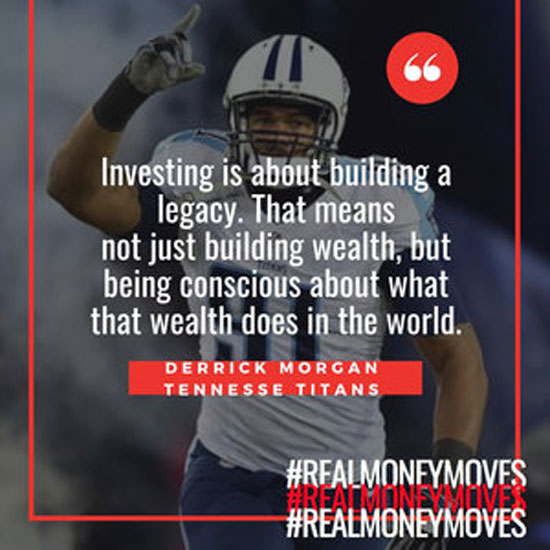
SOCAP: As far as divestment goes, you’ve had some really big wins as a movement. Many big name banks have already publicly committed to ending financial ties to private prisons. What are the next immediate goals that you hope to achieve?
Morgan Simon: At this point eight banks have announced that they are exiting the private prison industry. Six remain. Those eight banks represented an estimated 87.4% of future financing to the private prison system. We’ve already seen credit ratings being downgraded. This is not just a symbolic action. If they can’t get bank financing, these companies can’t build new facilities.
If you don’t have enough spaces to lock people up, then maybe you have to start having some conversations about other ways that you can support people, whether it’s mental health facilities or other solutions that actually address the problems at hand. So within that, I would say our goal is to use the lever of finance to eliminate the private prison industry and stimulate much more thoughtful response in the wake of both mass incarceration and immigrant detention.
Most of the major international banks have already committed to stay out and now it’s more about the regional, smaller banks. Increasingly, I think we are seeing that banks don’t want to land on the wrong side of history on this issue.
SOCAP: What will be necessary to keep the momentum of this movement going and how can the average person participate?
Morgan Simon: Aside from shutting down private prisons, there is another very concrete goal of the movement. When we started talking to the cultural influencers that partnered with Real Money Moves, so many of them told us, “Thank you so much for letting me know. I had no idea that my money was supporting private prisons! Where is my money invested?” They had never thought about that before. Then they asked how they could start to learn more comprehensively about impact investing as an opportunity to make money and make social change. We’ve seen a lot of organizing on progressive social issues within the NFL and the NBA as well.
We will continue to do outreach and help people understand what their options are. Real Money Moves is a nonprofit arm with an educational mission, but people want to know how to implement this stuff. It’s not a hypothetical. That’s where having a registered investment advisory has been helpful. We’re able to help people who want to start walking that road, whether it’s through us or through recommendations to others in the ecosystem.
Derrick Morgan: For me it all started watching Ava DuVernay’s documentary about the private prison industry, 13TH. That woke me up and prompted me to reach out to my advisor to make sure that my money wasn’t invested in prisons. I hope more people come to understand that these are publicly held companies and that you might be invested in them. Hopefully that wakes people up and prompts them to learn more about where their money is and what it is supporting.
Morgan Simon: Real Money Moves is not just about divesting from private prisons. Divestment as a tactic can feel like playing whack-a-mole–you wait to see where the next company that is doing terrible things will rise up.
With impact investing, especially if you are taking a 100% approach, you don’t have to worry. You just know that your money is working for social good all of the time. That is one of the broader objectives of the Real Money Moves campaign and our work with influencers and with the general public. We did a video series to help people understand how to act if they want to move their bank account or retirement account, or any of the different ways that you can engage with this movement.
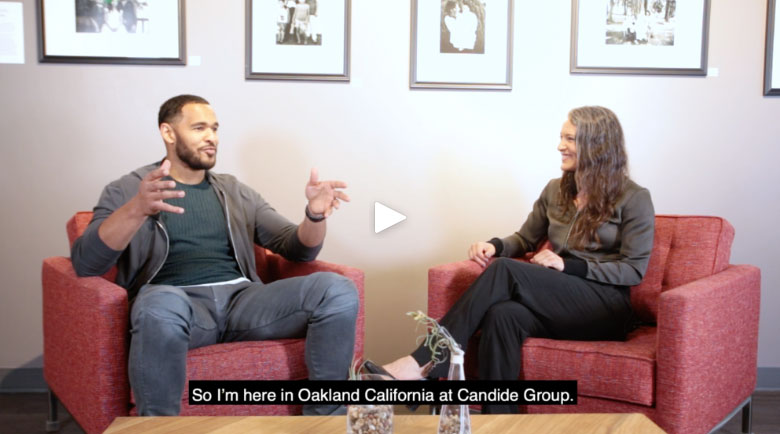 SOCAP: Derrick, how does your work with Real Money Moves connect to your recent launch of an Opportunity Zone fund?
SOCAP: Derrick, how does your work with Real Money Moves connect to your recent launch of an Opportunity Zone fund?
Derrick Morgan: Aside from divestment, people want to know the next steps they can take to put their money to good use. I think the Opportunity Zone program is a tool to help facilitate that. I think we’ll see a lot of interest from private capital, now that they are properly incentivized to come into these underserved, overlooked markets in a financial capacity. So now it’s all about making sure that investments are being done with the right approach. We want to see an inclusive approach to community building–not gentrification or displacement of residents.
My background is in Coatesville, Pennsylvania. That’s a suburb of Philly within Chester County, which is the state’s richest county, but Coatesville is one of the poorest cities in the state. The whole city is an Opportunity Zone. When I found that out, I wanted to know what I could do to help change the trajectory of the city. The Opportunity Zone designation makes that market more appealing to investors so you’re able to attract more capital. With the right investment approach, I believe we will really see transformative change in that market and in that community. So I think for me, over my journey getting into being an impact investor, I’ve been more socially aware of what my dollar does. I think there’s just, like I said, another tool and I’m willing to do what we’ve been doing, but at scale.
SOCAP: You will both be participating in sessions at SOCAP19 this October. How are you hoping to mobilize the community of impact investors and social entrepreneurs?
Morgan Simon: We’ll be participating in two panels. One session focused on family detention and Real Money Moves and the other will be more about our relationship with impact investing and the work Derrick and I have been able to do together through Real Money Moves and the Opportunity Zone fund.
We also plan to address the importance of creating opportunities for athletes and influencers to engage with impact investment. A number of athletes are first generation wealth holders. They face a real learning curve in how to manage their money, make the best financial decisions. It is not easy to gain access to really high quality financial advice. We view this as an incredible opportunity to help build wealth within communities of color and want to be really supportive of that. Part of the impact is getting strong financial returns. We hope to inspire other influencers that span the broader market to pay more attention to impact investing.
The impact investing community can get insular. My intention of speaking to the SOCAP community is to make sure that we are crafting messages and on-ramps in a way that are really accessible to people. That’s a lot of what we tried to do with Real Money Moves. With Candide Group, I’m deploying around $30M a year, which I think for impact investing is considered good. But compared to the $196T moving in the global economy, it’s absolutely nothing, right? So if we don’t start thinking about scaling ideas and scaling them to be about real people then we are not going to win the cultural war. That is so important to making sure that we can really popularize impact investing.
Derrick Morgan: Yes, it is about making impact investing more accessible to the average everyday person. When you mention investment, too many people think oh well I can’t participate in that. We need to open it up to more people and encourage mass adoption. That will require making it more culturally relevant. I think influencers have a big role to play in that.
SOCAP: What is inspiring you right now? What is giving you hope?
Morgan Simon: Well, Derrick Morgan inspires me and gives me hope. Just saying. It’s true, Derrick, so thank you for that. I think knowing that there are people who are really putting in their heartfelt commitment into making this work happen, the fact that I’m starting to actually envision a pathway towards the ending of the private prison industry–that’s inspiring to me. The ability to not just get mad, but get even is important.
I think if we just consider ourselves to be passive recipients of the news and the horror that’s happening to people all over the planet, then that I feel is defeating and depressing. The more that I’m able to read the paper and say, okay, how can this impact strategy be part of what we’re going to do to fix it–that gets me inspired and energized every day. And I think that any of us in the SOCAP community that touch capital–we all have that access. And I think that position comes, hopefully with inspiration, but also with a responsibility to do something because we can. And what an awesome position to get to be in.
Derrick Morgan: For me right now it’s the Opportunity Zone program. I wasn’t a big fan of it when I first heard of it. But the more I learned of the potential, the more I see $6.1T in unrealized gains in the U.S. economy being able to flow into those communities, the more it gives me hope. It also keeps me up at night. So it’s a double edged sword. But the more I go down this path, the more I meet people who care and who want to see investment done the right way. It gives me hope that I keep meeting more and more people out there who care, who share the same mindset. The more people that get it, and want to collaborate, the better.
Register for SOCAP19 to see Derrick Morgan and Morgan Simon in conversation live on stage at Fort Mason in October.
Excerpts from this interview were used in the article Real Money Moves: Derrick Morgan and Morgan Simon On Their Plan to Get Money Out of Private Prisons and Into Communities for Impakter
